Longhu Mountain boosts tourism with taoist culture, ecological conservation in E China
新華網
Editor: huaxia
2025-04-28 20:22:45
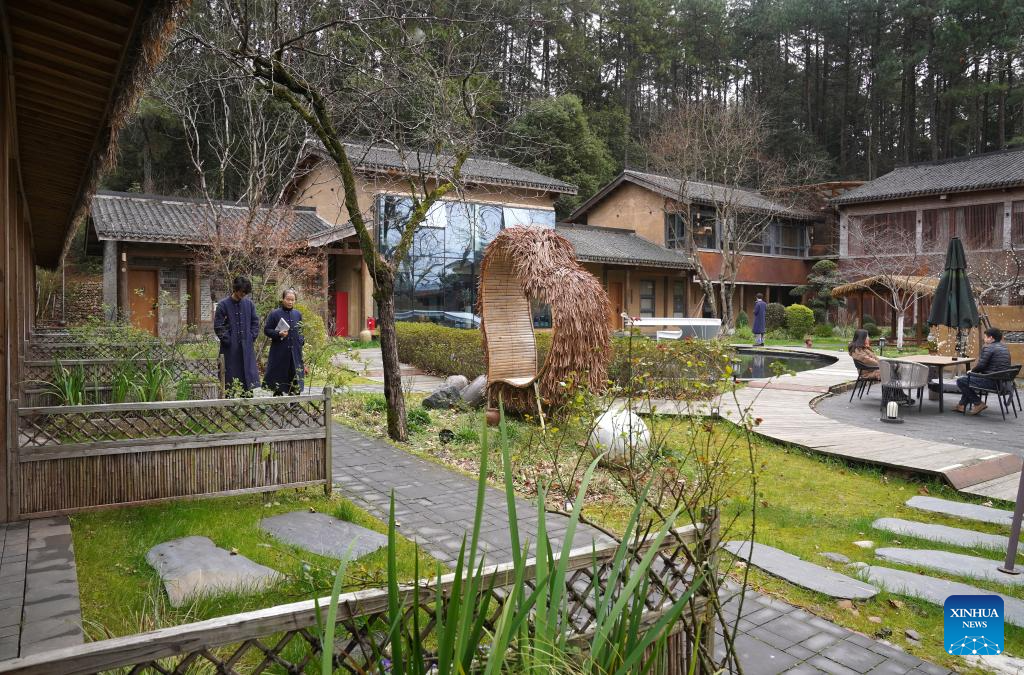
Tourists rest at a Taoism-themed homestay in Yingtan, east China's Jiangxi Province, March 6, 2025.
Titled UNESCO Global Geopark, Longhu Mountain of Jiangxi Province is a natural site on World Heritage List and one of the birthplaces of Taoism in China. Taoism, or Daoism, is a 2,000-year-old religion that originated from Laozi's philosophy. Its key doctrines include seeking harmony with the eternal cosmic order known as "Dao" and cherishing one's life.
In recent years, the Longhu Mountain scenic area has pioneered innovative mechanisms integrating culture and tourism, such as staging on-site performances and establishing Taoism-themed homestays, allowing visitors to immerse themselves in the charm of Taoist culture and the Danxia landform, characterized by reddish sandstone features.
The scenic area has also balanced tourism development with ecological conservation by setting up 112 environmental monitoring points and reviving traditional manual poling for over 200 bamboo rafts, reducing pollution while enhancing the touring experience. Currently, the forest coverage rate in the scenic area has increased to 69.9 percent. Rare bird species such as the Chinese merganser have reappeared in the mountains, showcasing a positive interaction between ecological preservation and sustainable tourism development. (Xinhua/Wan Xiang)
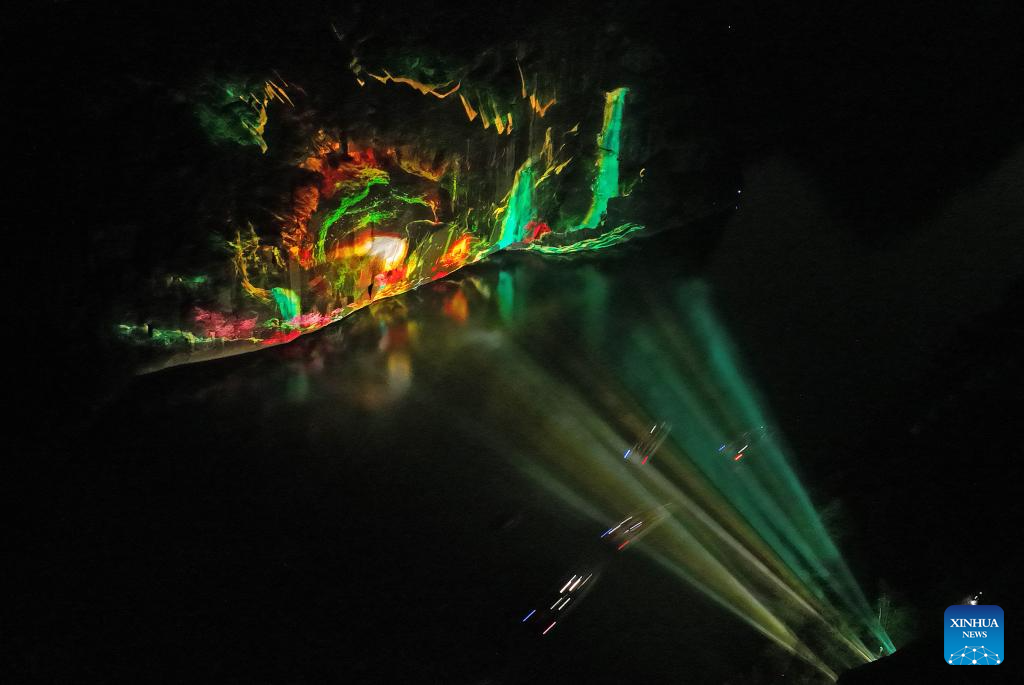
An aerial drone photo taken on March 24, 2025 shows an on-site performance staged at the Longhu Mountain scenic area in Yingtan, east China's Jiangxi Province.
Titled UNESCO Global Geopark, Longhu Mountain of Jiangxi Province is a natural site on World Heritage List and one of the birthplaces of Taoism in China. Taoism, or Daoism, is a 2,000-year-old religion that originated from Laozi's philosophy. Its key doctrines include seeking harmony with the eternal cosmic order known as "Dao" and cherishing one's life.
In recent years, the Longhu Mountain scenic area has pioneered innovative mechanisms integrating culture and tourism, such as staging on-site performances and establishing Taoism-themed homestays, allowing visitors to immerse themselves in the charm of Taoist culture and the Danxia landform, characterized by reddish sandstone features.
The scenic area has also balanced tourism development with ecological conservation by setting up 112 environmental monitoring points and reviving traditional manual poling for over 200 bamboo rafts, reducing pollution while enhancing the touring experience. Currently, the forest coverage rate in the scenic area has increased to 69.9 percent. Rare bird species such as the Chinese merganser have reappeared in the mountains, showcasing a positive interaction between ecological preservation and sustainable tourism development. (Xinhua/Wan Xiang)

Tourists visit a Taoist temple at the Longhu Mountain scenic area in Yingtan, east China's Jiangxi Province, March 6, 2025.
Titled UNESCO Global Geopark, Longhu Mountain of Jiangxi Province is a natural site on World Heritage List and one of the birthplaces of Taoism in China. Taoism, or Daoism, is a 2,000-year-old religion that originated from Laozi's philosophy. Its key doctrines include seeking harmony with the eternal cosmic order known as "Dao" and cherishing one's life.
In recent years, the Longhu Mountain scenic area has pioneered innovative mechanisms integrating culture and tourism, such as staging on-site performances and establishing Taoism-themed homestays, allowing visitors to immerse themselves in the charm of Taoist culture and the Danxia landform, characterized by reddish sandstone features.
The scenic area has also balanced tourism development with ecological conservation by setting up 112 environmental monitoring points and reviving traditional manual poling for over 200 bamboo rafts, reducing pollution while enhancing the touring experience. Currently, the forest coverage rate in the scenic area has increased to 69.9 percent. Rare bird species such as the Chinese merganser have reappeared in the mountains, showcasing a positive interaction between ecological preservation and sustainable tourism development. (Xinhua/Wan Xiang)
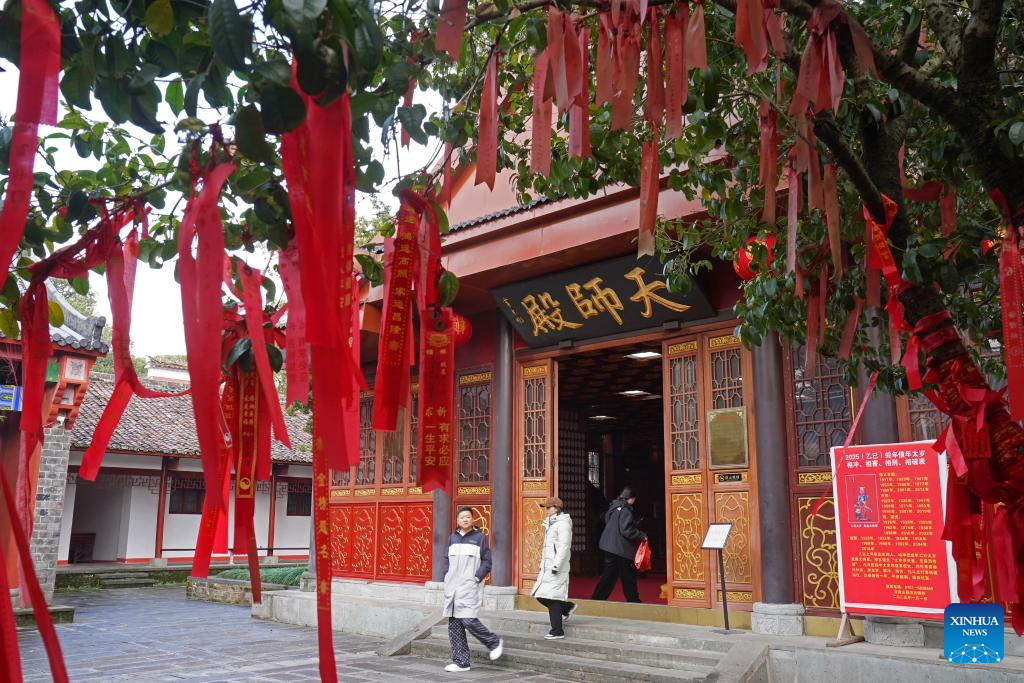
Tourists visit a Taoist temple at the Longhu Mountain scenic area in Yingtan, east China's Jiangxi Province, March 6, 2025.
Titled UNESCO Global Geopark, Longhu Mountain of Jiangxi Province is a natural site on World Heritage List and one of the birthplaces of Taoism in China. Taoism, or Daoism, is a 2,000-year-old religion that originated from Laozi's philosophy. Its key doctrines include seeking harmony with the eternal cosmic order known as "Dao" and cherishing one's life.
In recent years, the Longhu Mountain scenic area has pioneered innovative mechanisms integrating culture and tourism, such as staging on-site performances and establishing Taoism-themed homestays, allowing visitors to immerse themselves in the charm of Taoist culture and the Danxia landform, characterized by reddish sandstone features.
The scenic area has also balanced tourism development with ecological conservation by setting up 112 environmental monitoring points and reviving traditional manual poling for over 200 bamboo rafts, reducing pollution while enhancing the touring experience. Currently, the forest coverage rate in the scenic area has increased to 69.9 percent. Rare bird species such as the Chinese merganser have reappeared in the mountains, showcasing a positive interaction between ecological preservation and sustainable tourism development. (Xinhua/Wan Xiang)

Staff members monitor the Longhu Mountain scenic area in Yingtan, east China's Jiangxi Province, March 25, 2025.
Titled UNESCO Global Geopark, Longhu Mountain of Jiangxi Province is a natural site on World Heritage List and one of the birthplaces of Taoism in China. Taoism, or Daoism, is a 2,000-year-old religion that originated from Laozi's philosophy. Its key doctrines include seeking harmony with the eternal cosmic order known as "Dao" and cherishing one's life.
In recent years, the Longhu Mountain scenic area has pioneered innovative mechanisms integrating culture and tourism, such as staging on-site performances and establishing Taoism-themed homestays, allowing visitors to immerse themselves in the charm of Taoist culture and the Danxia landform, characterized by reddish sandstone features.
The scenic area has also balanced tourism development with ecological conservation by setting up 112 environmental monitoring points and reviving traditional manual poling for over 200 bamboo rafts, reducing pollution while enhancing the touring experience. Currently, the forest coverage rate in the scenic area has increased to 69.9 percent. Rare bird species such as the Chinese merganser have reappeared in the mountains, showcasing a positive interaction between ecological preservation and sustainable tourism development. (Xinhua/Wan Xiang)
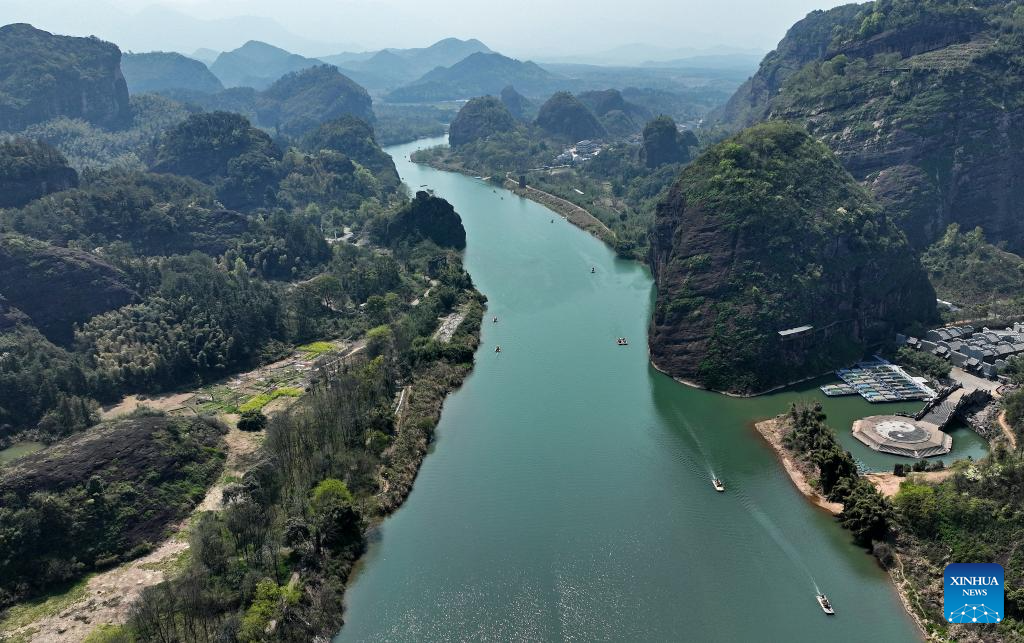
An aerial drone photo taken on March 25, 2025 shows tourists touring the Longhu Mountain scenic area on bamboo rafts in Yingtan, east China's Jiangxi Province.
Titled UNESCO Global Geopark, Longhu Mountain of Jiangxi Province is a natural site on World Heritage List and one of the birthplaces of Taoism in China. Taoism, or Daoism, is a 2,000-year-old religion that originated from Laozi's philosophy. Its key doctrines include seeking harmony with the eternal cosmic order known as "Dao" and cherishing one's life.
In recent years, the Longhu Mountain scenic area has pioneered innovative mechanisms integrating culture and tourism, such as staging on-site performances and establishing Taoism-themed homestays, allowing visitors to immerse themselves in the charm of Taoist culture and the Danxia landform, characterized by reddish sandstone features.
The scenic area has also balanced tourism development with ecological conservation by setting up 112 environmental monitoring points and reviving traditional manual poling for over 200 bamboo rafts, reducing pollution while enhancing the touring experience. Currently, the forest coverage rate in the scenic area has increased to 69.9 percent. Rare bird species such as the Chinese merganser have reappeared in the mountains, showcasing a positive interaction between ecological preservation and sustainable tourism development. (Xinhua/Wan Xiang)
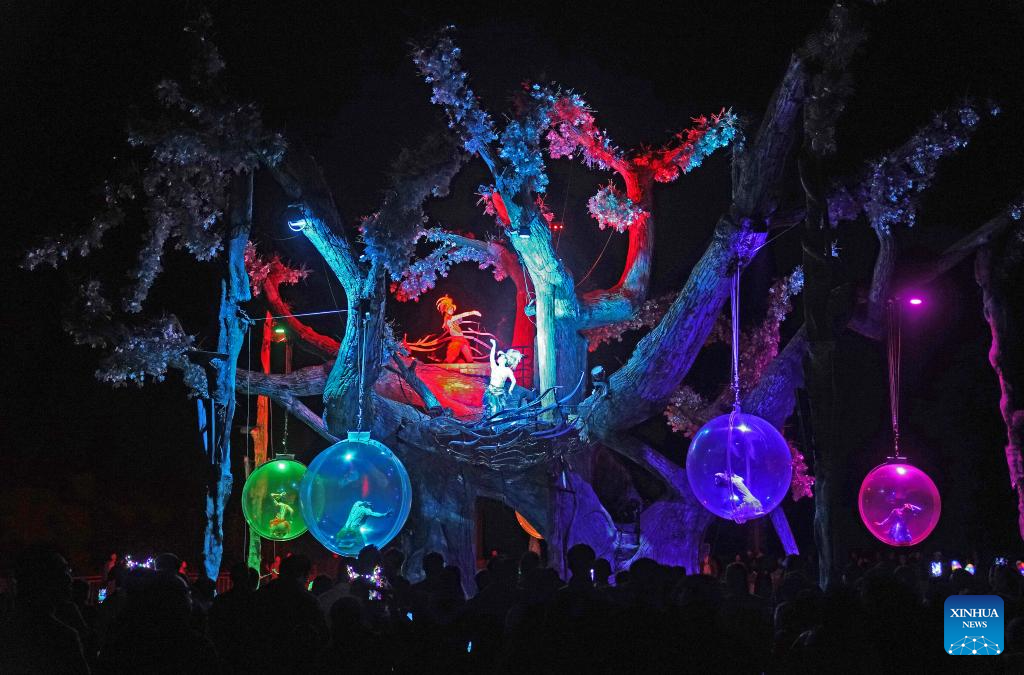
Tourists enjoy an on-site performance at the Longhu Mountain scenic area in Yingtan, east China's Jiangxi Province, March 24, 2025.
Titled UNESCO Global Geopark, Longhu Mountain of Jiangxi Province is a natural site on World Heritage List and one of the birthplaces of Taoism in China. Taoism, or Daoism, is a 2,000-year-old religion that originated from Laozi's philosophy. Its key doctrines include seeking harmony with the eternal cosmic order known as "Dao" and cherishing one's life.
In recent years, the Longhu Mountain scenic area has pioneered innovative mechanisms integrating culture and tourism, such as staging on-site performances and establishing Taoism-themed homestays, allowing visitors to immerse themselves in the charm of Taoist culture and the Danxia landform, characterized by reddish sandstone features.
The scenic area has also balanced tourism development with ecological conservation by setting up 112 environmental monitoring points and reviving traditional manual poling for over 200 bamboo rafts, reducing pollution while enhancing the touring experience. Currently, the forest coverage rate in the scenic area has increased to 69.9 percent. Rare bird species such as the Chinese merganser have reappeared in the mountains, showcasing a positive interaction between ecological preservation and sustainable tourism development. (Xinhua/Wan Xiang)
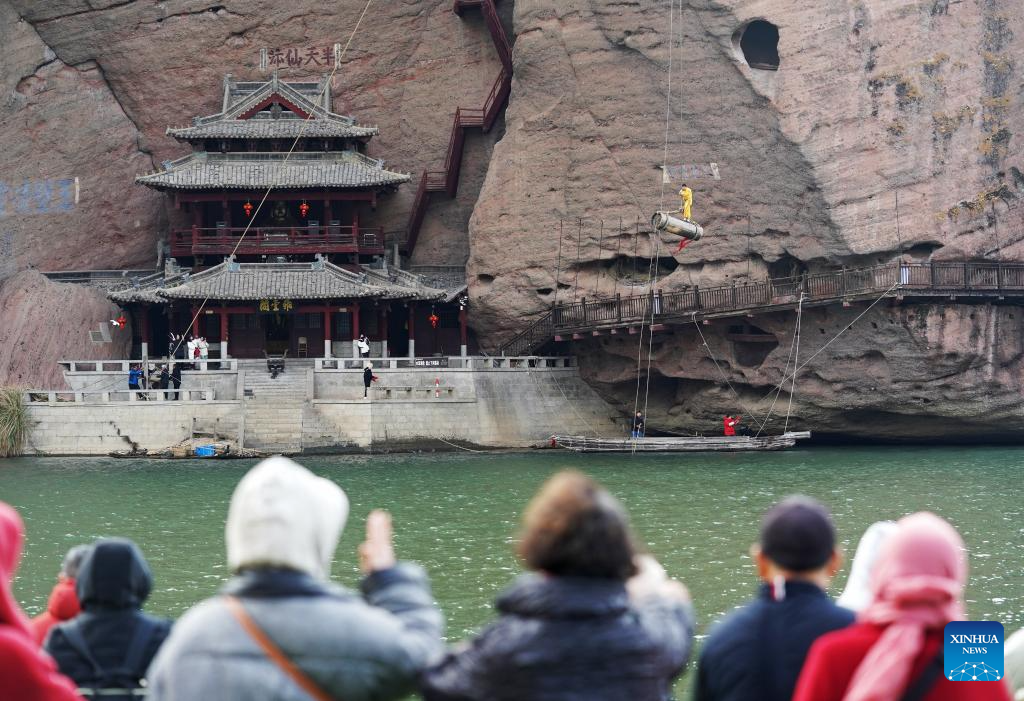
Tourists enjoy a performance at the Longhu Mountain scenic area in Yingtan, east China's Jiangxi Province, March 6, 2025.
Titled UNESCO Global Geopark, Longhu Mountain of Jiangxi Province is a natural site on World Heritage List and one of the birthplaces of Taoism in China. Taoism, or Daoism, is a 2,000-year-old religion that originated from Laozi's philosophy. Its key doctrines include seeking harmony with the eternal cosmic order known as "Dao" and cherishing one's life.
In recent years, the Longhu Mountain scenic area has pioneered innovative mechanisms integrating culture and tourism, such as staging on-site performances and establishing Taoism-themed homestays, allowing visitors to immerse themselves in the charm of Taoist culture and the Danxia landform, characterized by reddish sandstone features.
The scenic area has also balanced tourism development with ecological conservation by setting up 112 environmental monitoring points and reviving traditional manual poling for over 200 bamboo rafts, reducing pollution while enhancing the touring experience. Currently, the forest coverage rate in the scenic area has increased to 69.9 percent. Rare bird species such as the Chinese merganser have reappeared in the mountains, showcasing a positive interaction between ecological preservation and sustainable tourism development. (Xinhua/Wan Xiang)

An aerial drone photo taken on March 25, 2025 shows tourists touring the Longhu Mountain scenic area on bamboo rafts in Yingtan, east China's Jiangxi Province.
Titled UNESCO Global Geopark, Longhu Mountain of Jiangxi Province is a natural site on World Heritage List and one of the birthplaces of Taoism in China. Taoism, or Daoism, is a 2,000-year-old religion that originated from Laozi's philosophy. Its key doctrines include seeking harmony with the eternal cosmic order known as "Dao" and cherishing one's life.
In recent years, the Longhu Mountain scenic area has pioneered innovative mechanisms integrating culture and tourism, such as staging on-site performances and establishing Taoism-themed homestays, allowing visitors to immerse themselves in the charm of Taoist culture and the Danxia landform, characterized by reddish sandstone features.
The scenic area has also balanced tourism development with ecological conservation by setting up 112 environmental monitoring points and reviving traditional manual poling for over 200 bamboo rafts, reducing pollution while enhancing the touring experience. Currently, the forest coverage rate in the scenic area has increased to 69.9 percent. Rare bird species such as the Chinese merganser have reappeared in the mountains, showcasing a positive interaction between ecological preservation and sustainable tourism development. (Xinhua/Wan Xiang)
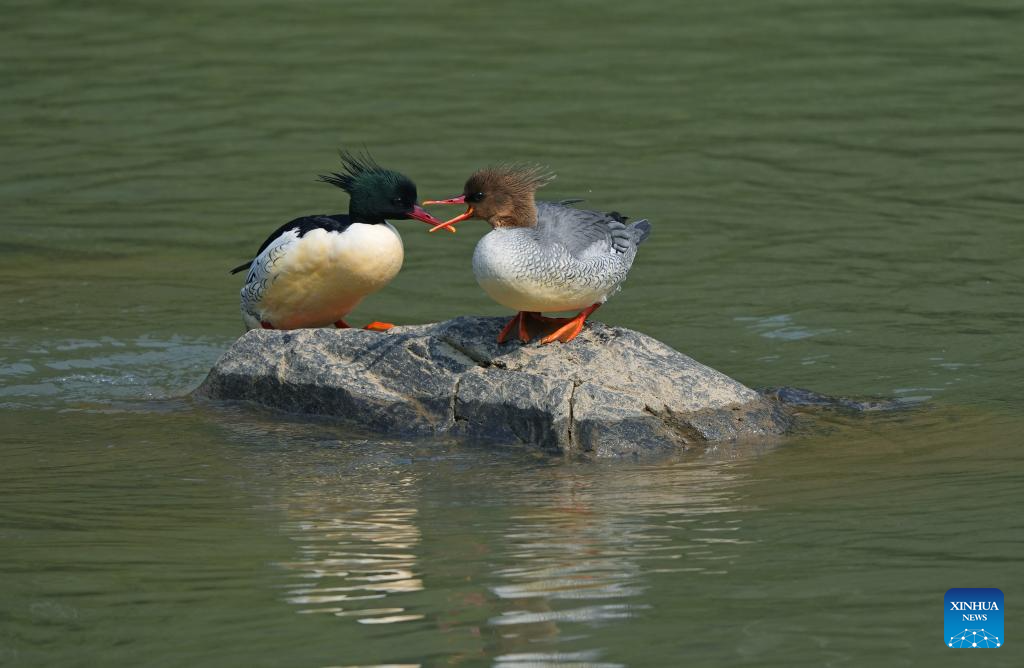
Chinese mergansers perch on a rock at the Longhu Mountain scenic area in Yingtan, east China's Jiangxi Province, Feb. 24, 2025.
Titled UNESCO Global Geopark, Longhu Mountain of Jiangxi Province is a natural site on World Heritage List and one of the birthplaces of Taoism in China. Taoism, or Daoism, is a 2,000-year-old religion that originated from Laozi's philosophy. Its key doctrines include seeking harmony with the eternal cosmic order known as "Dao" and cherishing one's life.
In recent years, the Longhu Mountain scenic area has pioneered innovative mechanisms integrating culture and tourism, such as staging on-site performances and establishing Taoism-themed homestays, allowing visitors to immerse themselves in the charm of Taoist culture and the Danxia landform, characterized by reddish sandstone features.
The scenic area has also balanced tourism development with ecological conservation by setting up 112 environmental monitoring points and reviving traditional manual poling for over 200 bamboo rafts, reducing pollution while enhancing the touring experience. Currently, the forest coverage rate in the scenic area has increased to 69.9 percent. Rare bird species such as the Chinese merganser have reappeared in the mountains, showcasing a positive interaction between ecological preservation and sustainable tourism development. (Photo by Xiao Dongyang/Xinhua)
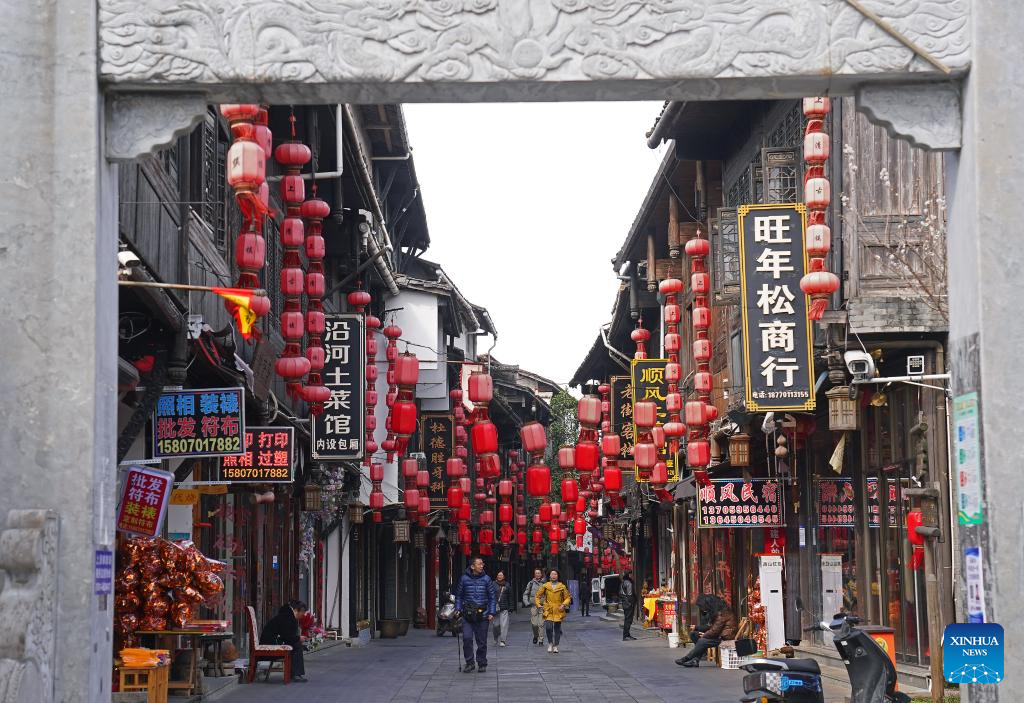
Tourists visit the Shangqing ancient town at the Longhu Mountain scenic area in Yingtan, east China's Jiangxi Province, March 6, 2025.
Titled UNESCO Global Geopark, Longhu Mountain of Jiangxi Province is a natural site on World Heritage List and one of the birthplaces of Taoism in China. Taoism, or Daoism, is a 2,000-year-old religion that originated from Laozi's philosophy. Its key doctrines include seeking harmony with the eternal cosmic order known as "Dao" and cherishing one's life.
In recent years, the Longhu Mountain scenic area has pioneered innovative mechanisms integrating culture and tourism, such as staging on-site performances and establishing Taoism-themed homestays, allowing visitors to immerse themselves in the charm of Taoist culture and the Danxia landform, characterized by reddish sandstone features.
The scenic area has also balanced tourism development with ecological conservation by setting up 112 environmental monitoring points and reviving traditional manual poling for over 200 bamboo rafts, reducing pollution while enhancing the touring experience. Currently, the forest coverage rate in the scenic area has increased to 69.9 percent. Rare bird species such as the Chinese merganser have reappeared in the mountains, showcasing a positive interaction between ecological preservation and sustainable tourism development. (Xinhua/Wan Xiang)
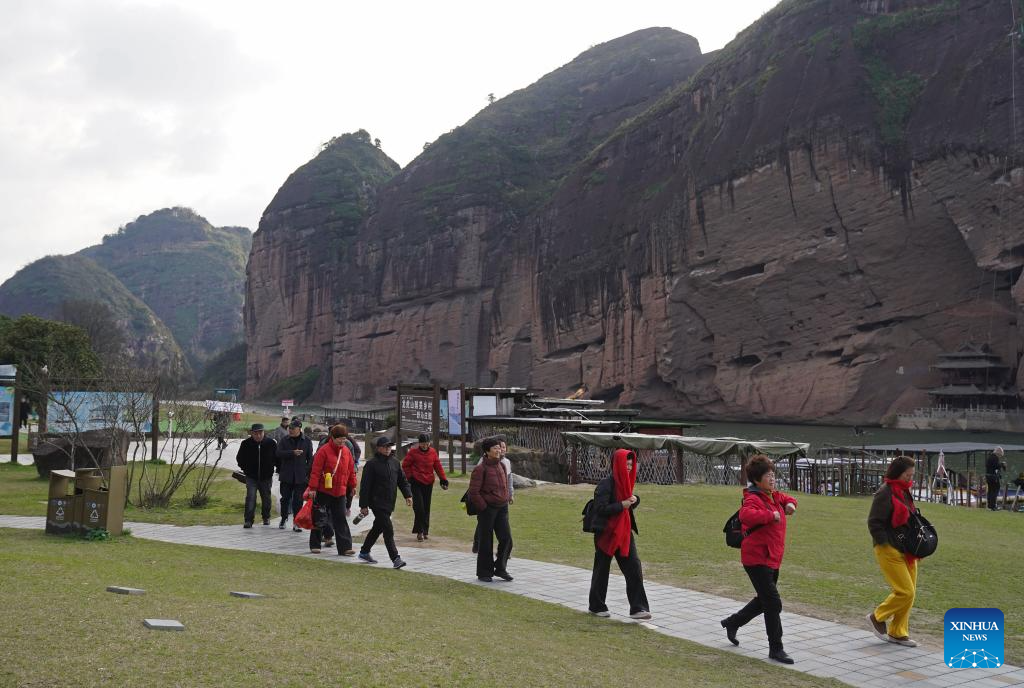
Tourists visit the Longhu Mountain scenic area in Yingtan, east China's Jiangxi Province, March 6, 2025.
Titled UNESCO Global Geopark, Longhu Mountain of Jiangxi Province is a natural site on World Heritage List and one of the birthplaces of Taoism in China. Taoism, or Daoism, is a 2,000-year-old religion that originated from Laozi's philosophy. Its key doctrines include seeking harmony with the eternal cosmic order known as "Dao" and cherishing one's life.
In recent years, the Longhu Mountain scenic area has pioneered innovative mechanisms integrating culture and tourism, such as staging on-site performances and establishing Taoism-themed homestays, allowing visitors to immerse themselves in the charm of Taoist culture and the Danxia landform, characterized by reddish sandstone features.
The scenic area has also balanced tourism development with ecological conservation by setting up 112 environmental monitoring points and reviving traditional manual poling for over 200 bamboo rafts, reducing pollution while enhancing the touring experience. Currently, the forest coverage rate in the scenic area has increased to 69.9 percent. Rare bird species such as the Chinese merganser have reappeared in the mountains, showcasing a positive interaction between ecological preservation and sustainable tourism development. (Xinhua/Wan Xiang)
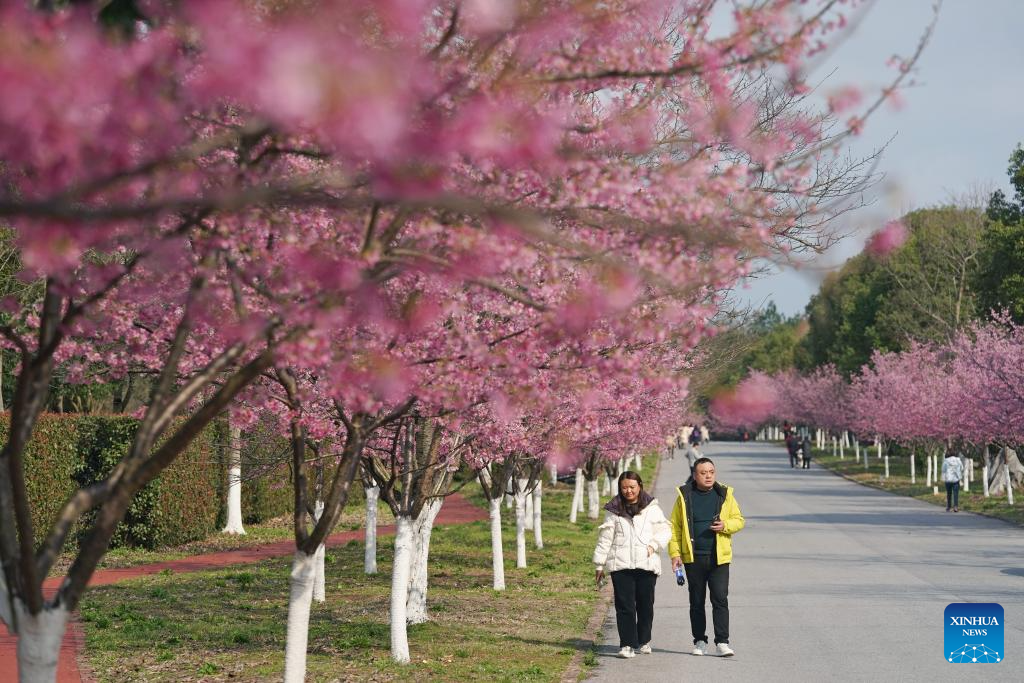
Tourists visit the Longhu Mountain scenic area in Yingtan, east China's Jiangxi Province, March 6, 2025.
Titled UNESCO Global Geopark, Longhu Mountain of Jiangxi Province is a natural site on World Heritage List and one of the birthplaces of Taoism in China. Taoism, or Daoism, is a 2,000-year-old religion that originated from Laozi's philosophy. Its key doctrines include seeking harmony with the eternal cosmic order known as "Dao" and cherishing one's life.
In recent years, the Longhu Mountain scenic area has pioneered innovative mechanisms integrating culture and tourism, such as staging on-site performances and establishing Taoism-themed homestays, allowing visitors to immerse themselves in the charm of Taoist culture and the Danxia landform, characterized by reddish sandstone features.
The scenic area has also balanced tourism development with ecological conservation by setting up 112 environmental monitoring points and reviving traditional manual poling for over 200 bamboo rafts, reducing pollution while enhancing the touring experience. Currently, the forest coverage rate in the scenic area has increased to 69.9 percent. Rare bird species such as the Chinese merganser have reappeared in the mountains, showcasing a positive interaction between ecological preservation and sustainable tourism development. (Xinhua/Wan Xiang)

Tourists rest at a Taoism-themed homestay in Yingtan, east China's Jiangxi Province, March 6, 2025.
Titled UNESCO Global Geopark, Longhu Mountain of Jiangxi Province is a natural site on World Heritage List and one of the birthplaces of Taoism in China. Taoism, or Daoism, is a 2,000-year-old religion that originated from Laozi's philosophy. Its key doctrines include seeking harmony with the eternal cosmic order known as "Dao" and cherishing one's life.
In recent years, the Longhu Mountain scenic area has pioneered innovative mechanisms integrating culture and tourism, such as staging on-site performances and establishing Taoism-themed homestays, allowing visitors to immerse themselves in the charm of Taoist culture and the Danxia landform, characterized by reddish sandstone features.
The scenic area has also balanced tourism development with ecological conservation by setting up 112 environmental monitoring points and reviving traditional manual poling for over 200 bamboo rafts, reducing pollution while enhancing the touring experience. Currently, the forest coverage rate in the scenic area has increased to 69.9 percent. Rare bird species such as the Chinese merganser have reappeared in the mountains, showcasing a positive interaction between ecological preservation and sustainable tourism development. (Xinhua/Wan Xiang)



